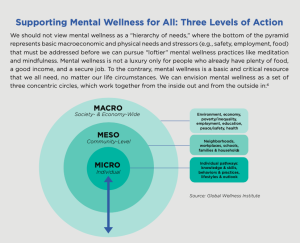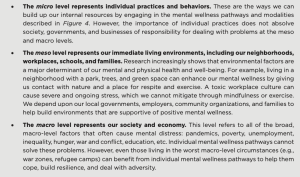
Is Mental Wellness an Individual or Collective Responsibility?
By Katherine Johnston and Ophelia Yeung, GWI senior research fellows
The notion that mental wellness is about self-care and personal agency does not imply that it is solely an individual pursuit or that it is fully within our own locus of control. Many of the pathways for mental wellness may sound like simple healthy lifestyle habits (e.g., eating well, exercising, access to nature, etc.), but they are often not accessible to people due to a host of reasons: financial, geographical, cultural, or the lack of knowledge or support systems.
The external and macro environment is not only an enabler or obstacle to pursuing mental wellness; it is often the very cause of our mental distress. People who are subject to systematic violence, cruelty, discrimination, abuse, injustice, war, poverty, famine, displacement, natural and manmade disasters, and other dire situations suffer major blows to mental wellness that are outside of their control. These types of trauma can trigger chronic mental distress that may take years, a lifetime, or even generations to overcome, and that may also lead to clinical mental illness.
Yet, even under adverse circumstances, our individual practices can fortify our mental wellness, and businesses and governments each have an important role to play to give people a boost on their mental wellness pathways. Mental illness and mental unwellness impose a massive economic and societal burden around the world. But governments and businesses have an incentive to promote mental wellness. As discussed in our report, practices that improve mental wellness can not only lessen the symptoms of mental illness but also reduce our risk of developing a mental illness. Mental wellness is also linked with many other positive outcomes, including better physical health, longevity, social relationships, and work performance.
Governments play a major role in our access to mental wellness. At the highest level, external and macro-level circumstances (e.g., poverty, unemployment, war, hunger) are major impediments to mental wellness, and these are shaped by government policies both nationally and locally (see figure below). Governments can help build up our mental wellness resources and enhance neuroplasticity early in our lifespans by supporting good prenatal and postnatal care or by teaching key skills like meditation and mindfulness in schools. At the city and community level, government policies can support mental wellness-enhancing physical and built environments (e.g., access to parks, green space, facilities for physical recreation, arts and culture, etc.).
Industry and businesses play a vitally important role in the mental wellness landscape. Mental wellness has grown out of a consumer-led, grassroots movement that demands self-directed, holistic, natural and alternative solutions outside of the established fields of medicine, psychiatry and psychology. Private businesses across many industries (hospitality, spas, technology, consumer goods, housewares, books and media, etc.) have become a major vehicle for developing new solutions by adopting and adapting mental wellness modalities and delivering them to consumers through multiple channels. For example, businesses have been especially active in launching technology-based innovations that expand access to mental wellness practices at a variety of price points; offer more choices and adaptations to individual preferences; provide new products, solutions and experiences; collect new data and evidence; and attract research resources and investments.


























































